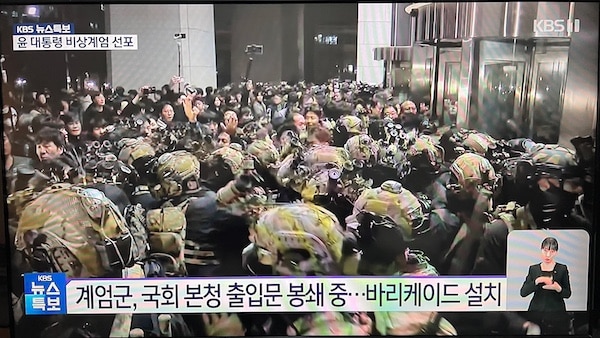On Wednesday morning in Korea, President Yoon declared that he would lift his decree of martial law following mass protest and a unanimous parliamentary vote against the measure. In a statement, Mr. Yoon claimed that he declared emergency martial law “as an act of national resolve against the anti-state forces that are trying to paralyze the essential functions of the state and disrupt the constitutional order of our liberal democracy.” Mr. Yoon continued, stating that he will “lift martial law as soon as we have a quorum in the cabinet. It’s early in the morning, so we don’t have a quorum yet.”
South Korean President Yoon Suk Yeol declared emergency martial law on Tuesday, December 3. In a televised broadcast, President Yoon declared that he would eradicate “shameless pro-North Korean anti-state forces.” Shortly after, South Korean parliamentarians voted against the martial law decree. Woo Won-sik, the chair of the National Assembly, declared the martial law decree to be “invalid” following the vote.
“The lives of the people are of no concern, and the government is in a state of paralysis due to impeachment, special investigation, and the defense of the opposition leader,” President Yoon declared in the televised address. This is the first time that martial law has been declared by a South Korean president since military rule in the 1980s.
In response to Yoon’s decree of martial law, the people of South Korea mobilized in opposition, with thousands protesting outside of the National Assembly with chants of “Abolish Martial Law! Down with dictatorship!” Reportedly, South Korean people attempted to block the entry of soldiers into the National Assembly with their bodies in order to ensure that the National Assembly would be able to vote against martial law. Of the 190 (out of 300 total) parliamentarians able to actually enter the National Assembly, all unanimously voted to lift martial law.
Under the martial law decree, “political activities” are banned, including rallies, political party activities, and labor activities. Yoon claimed that his political opposition’s moves to block his budget plans and impeach government officials has “paralyzed the administration.” As the situation continues to unfold, it is unclear if Yoon’s declaration will hold, and alongside it the different bans on activity, or if in fact the parliament vote will be respected.
South Korea is a key ally of the U.S. In response to Mr. Yoon’s declaration, the White House National Security Council has claimed that “the administration is in contact with the R.O.K. government and is monitoring the situation closely.”
The International Strategy Center (ISC) based in South Korea outlined in a statement some of the key context for understanding the situation unfolding in the country.
Some context can help us understand what might have triggered Yoon to declare martial law. First, accusations that Yoon had intervened in the elections have been escalating especially as new information kept being uncovered about his collaboration with power broker Myung Tae-gyun. In addition, the Democratic Party was getting ready to overturn Yoon’s veto on a bill creating a special investigation on the first lady around bribery and stock manipulation. The opposition Democratic Party also stated that they would reduce many of Yoon’s budget items, which would effectively make him a lame duck. Finally, the protests against Yoon have recently exploded to 100,000 people. Martial Law was the last card that Yoon had to play.
ISC affirmed that,
Overturning martial law would deal the last blow to the unpopular, warmongering, and authoritarian President Yoon Seok-yeol.
The North America-based Korean diaspora group Nodutdol released a statement shortly after Yoon’s declaration, pointing out that “despite not having full support even from his own party, Yoon is pushing his country and people to the brink of war. Yoon knows it will only escalate to deadly measures not only in South Korea but also between U.S.-backed South Korea and the DPRK.”
“We unequivocally condemn Yoon’s declaration of martial law,” the group wrote.
The people of South Korea have our full support to continue to fight for true democracy and sovereignty free of U.S. imperialism and a U.S.-backed South Korean government.
Ju-Hyun Park, an organizer with Nodutdol, told Peoples Dispatch that Yoon’s stated reason for declaring martial law, of eliminating so-called pro-North Korean forces,
is the exact excuse used by past military dictators in South Korea to declare martial law and violently repress popular movements for sovereignty and democracy.
Yoon is following in the footsteps of South Korean fascists like Rhee Syngman, Park Chunghee and Chun Doohwan. Fascists around the world are sure to be watching developments in South Korea closely.
Since publication, this article has been modified to reflect recent updates.

